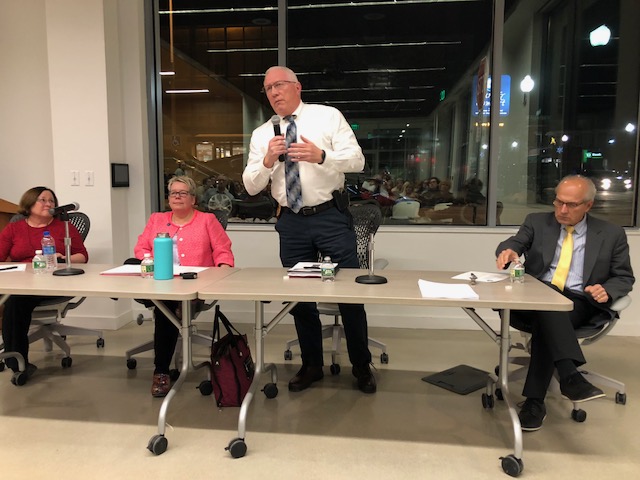WATERVILLE — Lisa Hallee spoke lovingly of her nephew, Chris Hallee, who was bright, loved people and could have had a wonderful career in just about anything. He was that talented, she said.
But Chris Hallee died of a fentanyl overdose on Nov. 14 last year in a Portland hospital.
“Yesterday was his birthday,” his aunt said. “It would have been his 37th birthday.”
She was speaking Thursday night to about 70 people who turned out for a forum on the opioid crisis at the Chace Community Forum in the Bill & Joan Alfond Main Street Commons downtown. The event was organized by Colby anthropology professor Winifred Tate and hosted by the Maine Drug Policy Lab at Colby College and the Maine Coalition for Sensible Drug Policy, of which Tate is a member.
Police Chief Joseph Massey spoke about his department’s HOPE program, which helps addicts get into treatment. Also speaking were Gordon Smith, the opioid response director for Gov. Janet Mills; and Rep. Charlotte Warren, D-Hallowell.
The crowd was silent as Lisa Hallee spoke of her nephew, whom she said was more like a son to her, because he had lived with her on and off since he was 19. She had tried to help him beat an opioid addiction that for years stripped him of a fulfilling and productive life, but the chronic disease ultimately won.
Her siblings, other family members and Chris Hallee’s friends sat in the audience, where people who didn’t know the family were crying. He could have been their son, grandson, brother, cousin, friend, Lisa Hallee said through her own tears.
She said he started using marijuana and consuming alcohol when he was a teenager. Along the way, there were many cries for help, though people at the time did not notice.
“You live life in the moment and you don’t always see the pattern emerge,” Hallee said.
His drug use increased over time, but his family did not call him an addict. They did not think of him that way, nor did he.
Chris Hallee was in and out of rehabilitation three times over the years. He was arrested for operating under the influence in Augusta. He called his aunt to say he was in jail and asked whether she would bail him out. She said no, but she would help him get into rehab. He said he was ready. She found him a bed in a New Hampshire center but had to figure out how to get him there. He said a friend would come up from Connecticut and take him there.
The jail released him, but it was 6 p.m. on a Wednesday, and the next thing Lisa Hallee knew, he was calling her the next day from the Cumberland County Jail, saying he was to see a judge the day after that. The jail released him on personal recognizance. She got him a hotel room.
The next morning, Lisa Hallee’s brother called her to say Chris Halle was in a coma in the hospital. He died after family members sat watch, night and day, at his bedside. It was two weeks after he had been arrested in Augusta.
“We struggled with the devastating awareness that Chris was gone, even though his body survived,” Hallee said.
Hallee and her large, close-knit family are angry as they deal with the loss, because it didn’t have to happen that way, she said.
As Smith, Warren and Massey had said earlier, so much more can be done for people suffering from opioid addiction and dependency: better communication within the judicial system and treatment sources, early childhood education and prevention, and intervention.
“We need to reconsider why we punish drug users,” Hallee said.
Her nephew, she said, could not get a good job because he had a criminal record, so he fell behind in payments and could not find a decent place to live. If he was found in possession of drugs, he was arrested.
“I think criminalizing possession of drugs marginalizes people,” Hallee said. “It doesn’t help anyone. When addicts ask for help, they should get it, period.”
More patient beds, sober houses, and transitional houses are needed, according to Hallee.
“Jails need resources to get the help they need and keep families in the loop,” she said.
Importantly, people need to create a community of caring to help stem the epidemic, according to Hallee. Addiction is a disease, not a character flaw, and isolation makes it worse, she said.
“Studies tell us that human connection is the best antidote to drug use. We do just the opposite. We put them away and we lock them up, and it’s wrong.”
Warren, the chairwoman of the Criminal Justice Committee in the Legisature, talked about efforts to fix what isn’t working in the crisis. Massey talked about the HOPE program, and Smith talked about his and the governor’s efforts to provide more naloxone, the overdose antidote, and to train recovery coaches and ensure all emergency rooms in the state provide resources for treatment and recovery.
There are resources for those wanting to get help. Nikki Busmani manages the 211 Maine program for the United Way agencies in Maine in partnership with the Maine Department of Health and Human Services, and they operate Maine’s Opiate Helpline, which provides free, confidential referrals by phone or text to anyone looking for opiate-related resources for themselves or anyone they know. Busmani said staff members answer calls and texts 24 hours a day, 365 days a year.
Meanwhile, MaineGeneral Health will co-host an event at 5:30 p.m. March 20 at Railroad Square Cinema, where the Netflix documentary “Recovery Boys” will be shown as part of a statewide effort to shed light on the opioid problem and efforts to address it. A panel discussion will follow the showing. Other event sponsors are Points North Institute and Maine Behavioral HealthCare.
Amy Calder — 861-9247
Twitter: @AmyCalder17
Send questions/comments to the editors.



